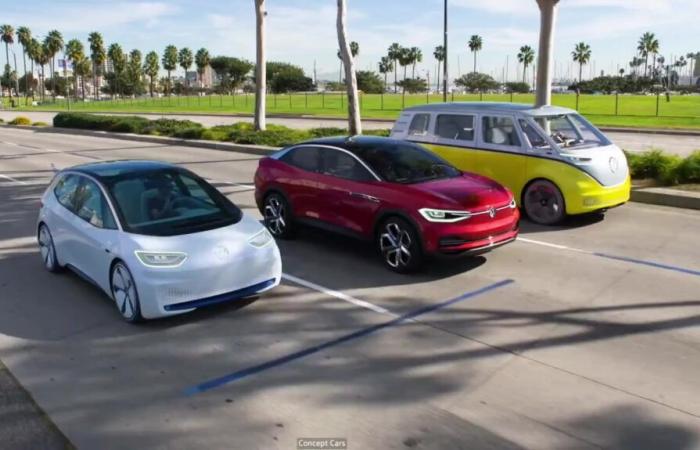Electric car news
German automobile giant Volkswagen is going through a difficult time in the electric vehicle market. Newly released figures for the third quarter of 2024 reveal a significant decline in sales, highlighting the challenges the manufacturer faces in this rapidly changing sector.
A worrying drop in electric sales
The Volkswagen Group recorded an alarming drop in 9,8% of its electric car sales in the third quarter of 2024 compared to the same period in 2023. Only 189,400 electric vehicles were delivered, compared to 209,900 the previous year. This decrease is part of a downward trend observed for several quarters, highlighting the manufacturer’s persistent difficulties in establishing itself in this highly competitive market.
The situation is particularly critical in the United States, where Volkswagen has suffered a dizzying drop in 41,7% of its electrical sales. Europe is not spared, with a drop in 11,9%. Only China offers a glimmer of hope, posting slight growth of 5.2%, surprising in a market dominated by local manufacturers.
A growing gap with market leaders
Volkswagen’s figures appear all the more worrying when compared to those of the market leaders. Since the start of 2024, Tesla has sold 1,255,078 electric carswhile the Chinese manufacturer BYD has sold 1 169 579. In comparison, Volkswagen only achieved 506,600 registrationsor less than half the sales of its main competitors.
This disparity is illustrated by the following table:
| Builder | 1st quarter 2024 | 2nd quarter 2024 | 3rd quarter 2024 | Cumulative 2024 |
|---|---|---|---|---|
| BYD | 300 114 | 426 039 | 443 426 | 1 169 579 |
| Tesla | 369 783 | 422 405 | 462 890 | 1 255 078 |
| Volkswagen | 136 400 | 180 800 | 189 400 | 506 600 |
These figures highlight the growing gap between Volkswagen and its direct competitors, highlighting the urgency for the German group to review its strategy in the electric vehicle market.
Mixed performance for flagship models
Despite this general downward trend, some Volkswagen models are holding up better than others. The ID.4 and ID.5 duo remains at the top of sales with 135,200 units delivered in the third quarter. The ID.3, the manufacturer’s compact model, follows with 105,900 sales. The Audi Q4 e-tron completes the podium with 78,800 copies elapsed.
On the other hand, other models struggle to find their audience. The recently launched premium sedan ID.7 was only sold 22,200 copies. Audi’s Q8 e-tron shows similar results with only 23,900 saleswhich led to the cessation of its production.
These figures reveal Volkswagen’s difficulties in offering a coherent and attractive electric range across all market segments.
Drastic measures to redress the situation
Faced with this critical situation, Volkswagen announced the implementation of a rigorous action plan aimed at reducing costs and improving its competitiveness. Among the measures envisaged:
- The closure of several factories to optimize production
- A reduction in the payroll and a review of salaries and bonuses
- Strengthening the alliance with the Chinese manufacturer Xpeng for the development of future electric models
These decisions demonstrate the scale of the challenges Volkswagen faces and the need for deep restructuring to remain competitive in the electric vehicle market.
Future prospects for Volkswagen
Despite these difficulties, Volkswagen has significant assets to bounce back. Its historical expertise in automobile production, its capacity for innovation and its global presence remain considerable advantages. The recent creation of a joint venture with Rivian in the United States could also open up new opportunities in the North American market.
Volkswagen’s future success will depend on its ability to accelerate its electric transition, optimize its production costs and offer innovative and competitive electric vehicles. The stakes are high for the German manufacturer, which must absolutely catch up with Tesla and BYD to maintain its place among the world automotive leaders.
In a constantly evolving market, Volkswagen will need to demonstrate agility and boldness to overcome its current difficulties and establish itself as a major player in electric mobility. The coming months will be crucial to determine whether the German giant will manage to turn things around and regain its place in the electrification race.
Written by Albert Lecoq
Specialist in electric car buying guides, I am passionate about new technologies and am a strong supporter of the adoption of electric technology and sustainable mobility.
React to the article







